Course overview
Sport facilities
Check out our range of industry-standard facilities for students studying sport-related courses within our School of Health & Life Sciences.
You help manage pain and dysfunction in sporting and clinical environments for athletes and sedentary people.
The course is accredited by the British Association of Sports Rehabilitators and Trainers (BASRaT), and there are opportunities to complete other vocational certified awards including pre-hospital trauma and gym-based instruction.
The course is a mixture of vocationally relevant skills with academic underpinning, giving you the latest evidence-based practice to facilitate the skills to become a confident, professional and successful rehabilitator.
You develop skills in sports massage; hands-on anatomy; manual diagnostic testing; gym-based conditioning and Olympic lifting; biomechanical and physiological screening; land and pool-base rehabilitation; peripheral and spinal mobilisations and trauma care. Academically, you develop key writing, report and statistical skills, while developing a scientific research ability.
At Teesside you are supported to develop your working practice via internal placements and key links with external professional football, rugby and clinical/health-based placements, giving you exposure to high level industry specific knowledge and facilities. You gain valuable experience in a range of professional environments, from internal sports massage clinics, rehabilitation clinics, pitch-side first aid, external sports teams and musculoskeletal practice.
Our meaningful industry relationships see employers access our facilities and knowledge base because they see it as pivotal to successful outcomes within industry. Your academic team are research and industry active, meaning you benefit from live case research, and cutting-edge developments in sports therapy and rehabilitation. This ensures you develop an evidence-base practice approach to your working practices, meaning you follow the science to help patients safely and effectively.
Top reasons to study this course:
- Nationally recognised: Teesside University is ranked 3rd overall and top in the North East for Sports Science in the Guardian University Guide 2025. (86 institutions ranked, tees.ac.uk/source).
- Industry-standard facilities: benefit your learning with our hydrotherapy pool, biomechanical suite, clinical practice setting, sports injury clinic, strength and conditioning spaces and physiology laboratories.
- Experienced teaching team: our academic team are research and industry active, many with practitioner backgrounds.
- Placement opportunities: our range of practice experience ensures you are work-ready.
- Recognition: we are accreditation by the British Association of Sports Rehabilitators and Trainers (BASRaT), with membership offering the ability to work in the United States of America, as well as the United Kingdom.
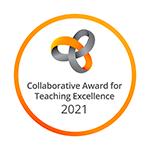
Teesside University Sports Therapy Clinics won the Collaborative Award for Teaching Excellence (CATE) 2021, which recognises and rewards collaborative work that has had a demonstrable impact on teaching and learning. Introduced in 2016, the scheme highlights the key role of teamwork in higher education. The clinics form a strategic part of the BSc (Hons) Sports Therapy and Rehabilitation course with students working in them across all three years of their studies.
Course details
Course structure
Year 1 core modules
You are introduced to aspects of clinical, functional and surface anatomy. Knowledge of the musculoskeletal system and its function is fundamental in all aspects of sports therapy and rehabilitation. Explore anatomy and human movement and learn about key concepts and theory.
Performance Analysis (Physiology & Biomechanics)
Explore a series of competency-based scientific methods for assessing human performance. You assess the physiological systems of the body, such as the cardio-respiratory system, skeletal muscle and the metabolic system, and investigate the biomechanical principles underpinning movement technique. Discuss important theories and background knowledge, and gain sport science lab skills, such as taking blood, measuring oxygen uptake, monitoring heart rate and movement analysis using 3D motion capture, and assessing ground reaction forces.
Professional Skills and Clinical Practice
Expand your knowledge of professional issues in healthcare and develop the interpersonal and study skills you’ll rely on throughout your studies and transition into industry. Explore key concepts in practice and professional conduct and learn how this affects clinical practice. You gain access to patients in the in-house massage clinic under the supervision of the clinical educators. This hands-on experience allows you to implement the skills you develop in other modules.
Develop your theoretical understanding and practical application of sports massage techniques. Learn theoretical concepts and create topical discussion on the application of techniques in the sporting environment. You expand on this theory, practicing and developing soft tissue massage techniques. You practice on peers under the supervision of the lecturing team to ensure you are safe and effective in your practice. These essential skills allow you to begin clinical experience and collate placement hours in the massage clinic.
Develop your skills of diagnostic examination assessment and immediate treatment of sports injuries. This is the first step to gain the professional skills required as a practitioner in the field of sports therapy and rehabilitation. This comprises the role of the practitioner in diagnosis, understanding and prevention of common musculoskeletal injury.
Year 2 core modules
Further develop your skills of assessment and acute injury management gained in year one. Key concepts and theory are introduced, and you develop your problem-solving skills and patient handling. You practice these skills on your peers and learn additional elements, including taping and strapping techniques, and indications for and application of electrotherapy.
Advanced Musculoskeletal Management
Gain an in-depth understanding of manual therapy techniques used in the assessment and management of musculoskeletal patients. Cover various hands-on approaches, such as joint mobilisation and other manual therapy techniques. Explore the theoretical underpinnings of these therapies, the biomechanics of the human body, and their application in the management of injuries and neuro-musculoskeletal dysfunction. Learn about the clinical reasoning and evidence-based practice required to safely and effectively integrate manual therapy into a broader rehabilitation programme for athletes and patients.
You are equipped with the knowledge of relevant research methods to develop a research proposal, which must be ethical and realistic. With this aim in mind, you are introduced to the key elements of quantitative and qualitative research design, methods and measurement, and a variety of data analysis techniques that allow you to answer different types of research questions.
Health Factors in Physical Activity and Sport
Develop your awareness for special populations and the nutritional and psychological demands on injured/uninjured athletes. You widen your understanding of more complex issues surrounding rehabilitation. Gain basic knowledge of assisting special populations and athletes with nutritional and psychological needs, within rehabilitation setting parameters.
Gain the confidence and practical skills to formulate and apply sport-specific progressive rehabilitation interventions, in relation to the injured athlete/person. The importance of therapeutic exercise in the rehabilitation is highlighted through a practical teaching strategy and problem-solving approach. Key topics are introduced, and you are encouraged to participate in practical sessions to develop your skills of progressive rehabilitation. This takes place in both land and gym-based settings and the University’s hydrotherapy pool.
This is a 20-credit module.
Final-year core modules
You improve your understanding of the processes involved in setting up a self-employed business within your discipline. Develop your understanding of business plans, cash-flows, marketing, taxes, accounting and leadership.
Clinical Experience and Professional Development
Practical experience is an integral component of this degree. You are placed in a sports injury environment, where you meet the complexities of real clinical situations. You retrieve and synthesise material previously learned and integrate it with new information gathered in relation to the patient. You apply practical, academic and other key skills appropriately, with the whole process organised through the sequence of data collection – including patient examination and assessment, interpretation, synthesis and evaluation. Your sound clinical reasoning must be justified from a theoretical underpinning and appreciation of evidence. This is followed by your application of skilful and safe treatment and inter-personal strategies.
Enhance your clinical skills, and carry out evidence-based problem solving, with a clinical reasoning approach to learning. You use the assessment, diagnostic, treatment and rehabilitation skills you’ve developed to manage sport and health-related injuries. Through reflection, you evaluate the use of evidence-based practice and the challenges of implementing this into clinical practice. You study major peripheral joints and carry out an in-depth critical approach to patient management, using skills learnt from previous modules. Recent controversies within sports medicine are discussed and critiqued including closed kinetic or open kinetic chain activity, and accelerated v’s or traditional rehabilitation programmes. You evaluate and put into practice the principles of sport-specific rehabilitation protocols, functional progression, functional musculoskeletal screening and the sensitivity and specificity of special tests.
Orthopaedics and Trauma Management
Gain multidisciplinary knowledge, understanding and insight into the principles, concepts and terminology underpinning pathologies and injury management for first aid, common orthopaedic conditions and traumatic injury. You synthesise and critically reflect on the theoretical knowledge and consider the role of the sports therapist and rehabilitation in the management of patients with traumatic injuries, through a problem-based learning approach. You discuss important theoretical concepts and advance your trauma management skills, clinical reasoning and problem solving.
Conduct your own in-depth scientific investigation in an area of your choice, within the field of sport, exercise and rehabilitation. With guidance from your supervisor, you use scientific methods to explore interesting research questions. Your aim is to discover new knowledge to support the progress of applied and theoretical work, within your chosen discipline.
Modules offered may vary.
How you learn
The programme employs a diversity of learning and teaching methods including: lectures, seminars, problem based learning, workshops, laboratory sessions, independent research projects. All modules on the programme are delivered via blended learning, which uses a combination of face-to-face learning and online delivery. Each module has a site in the University’s Virtual Learning Environment (Blackboard), which adheres as a minimum to the University’s Threshold Quality Standards. Where applicable modules include electronic submission, assessment and feedback.
Timetabling information
As a full-time student your timetabled hours are between Monday to Friday, 9.00am - 6.00pm. On Wednesdays the latest you will be timetabled is until 1.00pm. Hours of attendance vary between 12 hours and 20 hours per week.
Our Disability Services team provide an inclusive and empowering learning environment and have specialist staff to support disabled students access any additional tailored resources needed. If you have a specific learning difficulty, mental health condition, autism, sensory impairment, chronic health condition or any other disability please contact a Disability Services as early as possible.
Find out more about our disability services
Find out more about financial support
Find out more about our course related costs
Entry requirements
2026-27 entry requirements
For Clearing 2025 entry requirements, please refer to the information in the box above.
A typical offer is 88-112 tariff points from at least two A levels (or equivalent) - one should be in a sport, science or PE subject. You must also have GCSEs in English, maths and science at grade 4 (grade C) or equivalent. We recommend an Access course if you're a mature student.
An enhanced criminal history (DBS) check may be required for certain modules or placements which involve working with children and/or adults at risk. The DBS check is funded by the School of Health & Life Sciences so you do not need to pay for this process.
For general information please see our overview of entry requirements.
International applicants can find out what qualifications they need by visiting Your Country.
You can gain considerable knowledge from work, volunteering and life. Under recognition of prior learning (RPL) you may be awarded credit for this which can be credited towards the course you want to study.
Find out more about RPL
Employability
Work placement
You are required to complete a CPD portfolio which is an integral part of the programme to enhance your employability skills and help you to meet professional body requirements.
Career opportunities
You have numerous options available to forge a career. Becoming an accredited member of BASRaT you can work in professional sport, clinical practice or open your own practice.
Through registration with governing bodies, you can seek careers specifically within the NHS, Ministry of Defence and numerous sports environments, including rehabilitation, sport, health and exercise.
Pursuing an academic route, graduates can consider master’s and PhD-level study, go in to teaching or research.
Information for international applicants
Qualifications
International applicants - find out what qualifications you need by selecting your country below.
Select your country:
Useful information
Visit our international pages for useful information for non-UK students and applicants.


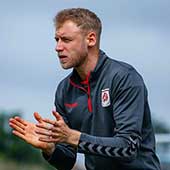 BSc (Hons) Sports Therapy and Rehabilitation and MSc Physiotherapy (Pre-registration)
BSc (Hons) Sports Therapy and Rehabilitation and MSc Physiotherapy (Pre-registration) BSc (Hons) Sports Therapy and Rehabilitation
BSc (Hons) Sports Therapy and Rehabilitation BSc (Hons) Sports Therapy and Rehabilitation
BSc (Hons) Sports Therapy and Rehabilitation 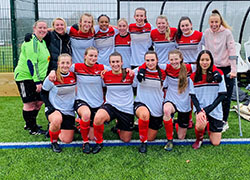 Teesside University footballers secure sporting success
Teesside University footballers secure sporting success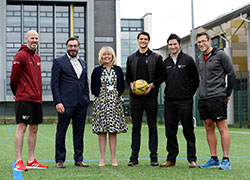 Former Middlesbrough Football Club player George Friend launches new university Football Academy
Former Middlesbrough Football Club player George Friend launches new university Football Academy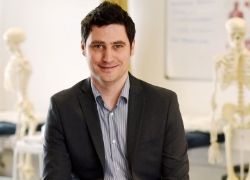 Teesside academics excel in national teaching and learning awards
Teesside academics excel in national teaching and learning awards